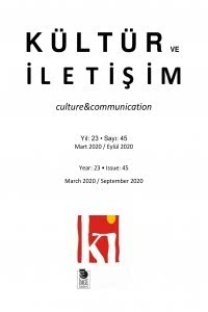Küresel Medya Formatlarının Temel Aktörleri
Medya, küreselleşmenin ekonomik ve kültürel yansımalarının görüldüŞü pek çok alandan biridir. Medyadaki birleşmeler ve uluslararası anlaşmaları kapsayan televizyon formatları çok uluslu holdingler, uluslararası ortaklık ve birleşmeler, kültürel hegemonya gibi farklı boyutlarda ele alınan medya ve küreselleşme tartışmalarına dâhil olmaktadır. Küresel medya formatlarının dünyadaki yayılımı liberal politikaların etkisi ve televizyon yayıncılıŞının deŞişimi ile beraber 1980'ler sonrası artmış, 2000'lerle beraber birçok ülkenin televizyon yayıncılıŞında egemen konuma gelmiştir. Bu baŞlamda çalışmada küresel televizyon formatlarına odaklanılarak, küresel televizyon formatlarının tarihsel gelişimiyle beraber format alanındaki temel aktörler betimlenmiş, formatların avantaj ve dezavantajları belirtilmiş ve küresel medya formatlarının küresel medya endüstrisi içindeki yeri açıklanmış; formatlar küresel ve yerel kültür açısından deŞerlendirilerek küresel formatların yerelle kurduŞu ilişki melezleşme üzerinden ele alınmıştır
Key Actors of Global Media Formats
Media is one of the many sectors where the economic and cultural reflections of globalisation are displayed. Discussions on the media and globalisation have many dimensions such as multinational corporations, international mergers and acquisitions and cultural hegemony. Television formats are included in these discussions as they are globally circulated and, therefore, directly related to globalisation of the media. Following the 1980’s, global dissemination of the media formats has increased with the impact of neoliberal policies and the changes in television broadcasting. Especially, from the 2000s onwards, these formats have become dominant in television broadcasting all around the World. By focusing on the global television formats, this study describes the historical development of the television formats, the main actors in the sector, advantages and disadvantages of these formats and the place of the global media formats in the global media industry. The formats are evaluated in terms of global and local culture and the relationship between the global formats and local culture is addressed through the concept of “hybridisation”.
___
- Agger, Gunhild (2006). “Format Trade and Tv Drama - Friends for Life? Danish Tv Drama in a Global Context.” Lennard Hojbjerg ve Henrik Sondergaard (der.) içinde. European Film and Media Culture. Museum Tusculanum Press. University of Copenhagen. 179-203.
- Baltruschat, Doris (2010). Global Media Ecologies. Networked Production in Film and Television. Routledge.
- Chalaby, Jean K (2011). “The Making of an Entertainment Revolution: How the TV Format Trade Became a Global Industry”. European Journal of Communication 26(4): 293-309.
- Chalaby, Jean K (2012). “At the Origin of a Global Industry: The TV Format Trade as an Anglo-American Invention”. Media Culture Society 34(1): 36-52.
- Çelenk, Sevilay (2009). “Televizyon Format Uyarlamalarında KimliŞin Mührü: Hayalin şçin Söyle”. Kültür ve şletişim 12(2): 9-45.
- Endemol (2014a). http://www.endemol.com/who-we-are/. Erişim tarihi: 26.05.2014.
- Endemol (2014b). http://www.endemol.com/what/formats. Erişim tarihi: 26.05.2014.
- Endemol (2014c). http://www.endemol.com/what/distribution. Erişim tarihi: 26.05.2014.
- FRAPA (2014a). http://www.frapa.org/. Erişim tarihi: 20.05.2014.
- FRAPA (2014b). http://www.frapa.org/about/members/. Erişim tarihi: 20.05.2014.
- FRAPA (2014c). http://www.frapa.org/about/history/. Erişim tarihi: 20.05.2014.
- Fremantle Media (2014). http://www.fremantlemedia.com/Digital.aspx. Erişim tarihi: 29.05.2014.
- Hawkins, Gay (2001). “The Ethics of Television”. International Journal of Cultural Studies 4(4): 412- 426.
- Keane, Michael ve Albert Moran (2008). “Television’s New Engines”. Television New Media 9: 155–169.
- McMillin, Divya C (2007). International Media Studies. Blackwell Publishing.
- MIPCOM (2014). http://www.mipcom.com/the-event/overview/. Erişim tarihi: 29.05.2014.
- MIPTv (2014a). http://www.miptv.com/. Erişim tarihi: 16.05.2014.
- MIPTv (2014b). http://www.miptv.com/en/the-event/. Erişim tarihi: 16.05.2014.
- Mjos, Ole J (2010). Media Globalization and the Discovery Channel Networks. Routledge.
- Moran, Albert (1998). Copycat Tv. Globalisation, Program Formats and Cultural Identity. University of Luton Press.
- Moran, Albert (2009). “Global Franchising, Local Customizing: The Cultural Economy of TV Program Formats”. Journal of Media & Cultural Studies 23(2): 115-125.
- Moran, Albert ve Michael Keane (2006). “Copycat Tv and New Trade Routes in Asia and The Pasific”. Sylvia Harvey (der.) içinde. Trading Culture. Global Traffic and Local Cultures in Film and Television. UK: John Libbey Publishing. 105- 117.
- Morley, David ve Kevin Robins (2011). Kimlik Mekânları: Küresel Medya, Elektronik Ortamlar ve Kültürel Sınırlar. Çev., Emrehan ZeybekoŞlu.
- şstanbul: Ayrıntı Yayınları.
- NATPE (2014a). https://www.natpe.com/market. Erişim tarihi: 27.05.2014.
- NATPE (2014b). https://www.natpe.com/about. Erişim tarihi: 27.05.2014.
- Oren, Tasha ve Sharon Shahaf (der.) (2012). Global Television Formats: Understanding Television Across Borders. New York: Routledge.
- Rose d’OR (2014). http://www.rosedor.com/. Erişim tarihi: 29.05. 2014.
- RTL Group (2014a). http://www.rtlgroup.com/www/htm/ataglance.aspx. Erişim tarihi: 27.05.2014.
- RTL Group (2014b). http://www.rtlgroup.com/www/htm/profile.aspx. Erişim tarihi: 27.05.2014.
- RTLGroup (2014c). http://www.rtlgroup.com/www/htm/home_news.aspx?ID= 2E1B6187870C4448B5BE03F18B90E1D1, Erişim tarihi: 29.05.2014.
- Scholte, Jan Aart (2005). Globalization: A Critical Introduction. New York: Palgrave Macmillan.
- Thompson, John B (2008). “şletişimin Küreselleşmesi”, Çev., Bülent Özçelik. David Held ve Anthony McGrew (der.) içinde. Küresel Dönüşümler. Büyük Küreselleşme Tartışmaları. Ankara: Phoenix Yayınevi. 295–310.
- Tomlinson, John (1999). Kültürel Emperyalizm. Çev., Emrehan ZeybekoŞlu. şstanbul: Ayrıntı Yayınları.
- Tomlinson, John (2004). Küreselleşme ve Kültür. Çev., Arzu Eker. şstanbul: Ayrıntı Yayınları.
- Waisbord, Silvio (2004). “McTV: Understanding the Global Popularity of Television Formats”. Television New Media 5: 359- 383.
- Wayne, Mike (2006). Marksizm ve Medya Araştırmaları: Anahtar Kavramlar, ÇaŞdaş EŞilimler. Çev., Barış Cezar. şstanbul: Yordam Kitap. WIPO (2014a). http://www.wipo.int/amc/en/index.html. Erişim tarihi: 25.05.2014.
- WIPO (2014b). http://www.wipo.int/about-wipo/en/. Erişim tarihi: 25.05.2014.
- ISSN: 1301-7241
- Yayın Aralığı: Yılda 2 Sayı
- Başlangıç: 1998
- Yayıncı: İmge Kitabevi Yayınları
Sayıdaki Diğer Makaleler
Göndergesiz Nostalji: Günümüzde FotoŞrafik şmge
Ulusaşırı şslam ve Milliyetçilik: Bir Sosyal-CoŞrafi Tahayyül Olarak Köln Merkez Camii
Direnen FotoŞraflar: Türkiye’de Toplumsal BelleŞin şkonlaşmış şmgeleri
Gezi Direnişi ve Kadın Özneler
Ekrandaki “Öteki”: 2000 Sonrası Yerli Dizilerde Azınlıkların Temsili
Senem Sönmez SELÇUK, Ürün Yıldıran ÖNK
Internet Arama Motorları ve Kamusal Alan Arama Motorları Kimin İçin Çalışıyor.?
Küresel Medya Formatlarının Temel Aktörleri
